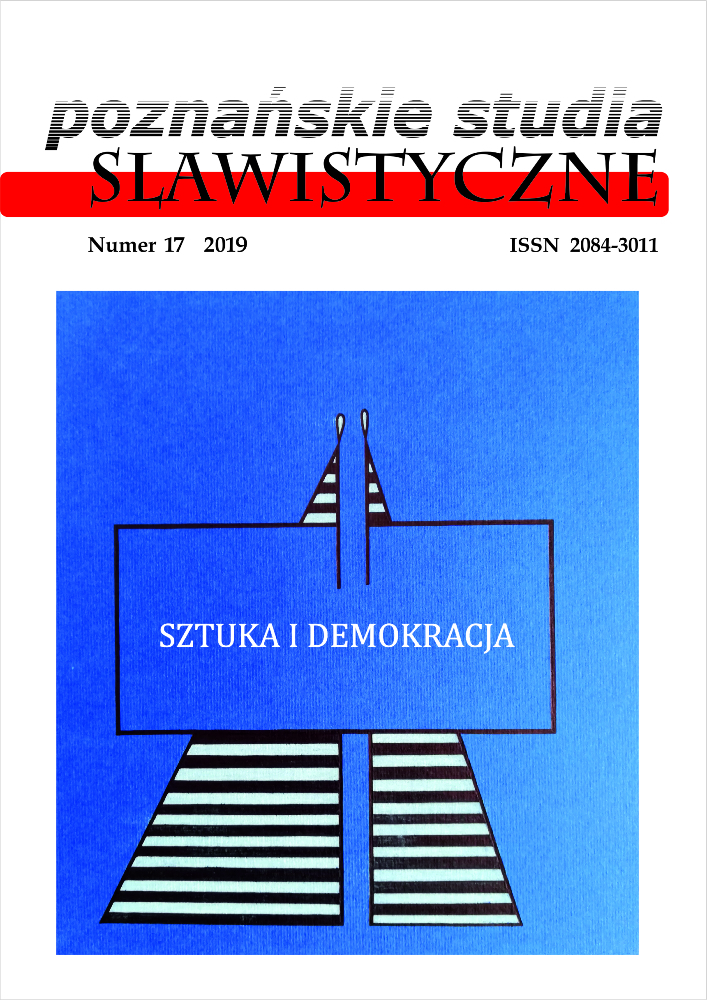Abstrakt
The paper starts from the assumption that Croatian modern lyric, from Matoš to Maleš, is haunted by various monsters, phantoms and mutants, and possessed by ghosts. Phantasmal hair speaks, the body changed by illness acquires autonomy, bird-men, space-twins and angels inhabit the humanized world, the dead seek eternity, the turtle measures itʼs own existence in relation to space and time, and Jesus-fish according to the degree of its own evolutionary transformation, while language cyborgs and hybrid beings are born. The lyric about monsters is itself a monstrous discourse. In this discourse human existence is necessarily contaminated by the abhuman and the parahuman, language includes its own mutations, and the encounter with meaning depends on the ultimate deformation, hybridization and disappearance of meaning. Thus, in the very center of our humanity, in the artistic form that determines the measure of the humanity of our community, questions about what is humane and inhumane, how to determine the boundary between them, and is not the general understanding of humanity always-already determined by oneʼs own inhuman or a-human are raised. Looking at a series of lyric texts, the paper will analyze these relationships and subsequently show their possible political and legal effects. I will refer to theoreticians who read the lyric as a linguistic event and performative type of utterance (J. Culler, P. de Man, B. Johnson, and others) and to thinkers who, to say it simply, perceive the ideas of equality, law and justice as phantasmal, mutated, scandalous or monstrous democracy (G. Agamben, J. Rancière, J. Derrida, J-L. Nancy and others).Bibliografia
Bagić, K. (2001). Jezik za svaku udaljenost. Zagreb: Naklada MD.
Centre national de ressources textuellles et lexicales. http://www.cnrtl.fr/etymologie/tort. 4.02.2019.
Cesarić, D. (1996). Izabrane pjesme. Prir. V. Pavletić. Zagreb: Matica.
Culler, J. (2015). Theory of the Lyric. Cambridge - London: Harvard University Press. https://doi.org/10.4159/9780674425781
De Man, P. (1981). Hypogram and Inscription: Michael Riffaterreʼs Poetics of Reading. "Diacritics" no. 4, str. 17-35. https://doi.org/10.2307/464972
Derrida, J. (1992). Force of Law: The Mystical Foundation of Authority. U: Decon struction and the Possibility of Justice. Eds D. Cornell, M. Rosenfeld, D. Grey Carlson. London: Routledge, str. 1-67.
Derrida, J. (1997). Of Grammatology. Baltimore: The Johns Hopkins University Press.
Derrida, J. (2002). Sablasti Marxa. Stanje duga, rad tugovanja i nova internacionala. Zagreb: Hrvatska sveučilišna naklada.
Dragojević, D. (1961). Kornjača i drugi predjeli. Split: Matica hrvatska.
Drenjančević, I. (2014). Nemoguć zahtjev: očuvati leš teksta. "Umjetnost riječi" br. I, str. 1-16.
Foucault, M. (1999). Les anormaux. Paris: Gallimard - Le Seuil.
Frangeš, I. (1996). Silvije Strahimir Kranjčević. U: Silvije Strahimir Kranjčević. Izabrana djela. Zagreb: Matica hrvatska, str. 13-40.
Freud, S. (2003). The Uncanny. New York: Penguin Books.
Gordon, A. F. (2013). Her shape and his hand. U: The Spectralities Reader. Ghost and Hunting in Contemporary Cultural Theory. Eds M. del Pilar Blanco i E. Peeren. London: Bloomsbury, str. 103-129.
Kranjčević, S. S. (1996). Izabrana djela. Prir. I. Frangeš. Zagreb: Matica hrvatska.
Matoš, A. G. (1976). Sabrana djela. Pjesme. Pečalba. Ur. D. Tadijanović. Zagreb: JAZU-Sveučilišna naklada Liber.
Nancy, J.-L. (2012). Finite and Infinite democracy. U: Democracy in the What State? New York: Columbia University Press, str. 58-75.
Rancière, J. (1995). La Mesentente: Politique et philosophie. Paris: Editions Galilee.
Rancière, J. (1999). Disagreement. Politics and Philosphy. Minneapolis - London: University of Minnesota Press.
Rancière, J. (2008). Mržnja demokracije. Zagreb: Ljevak.
Rancière, J. (2009). Aesthetics and its Discontents. Cambridge: Polity Press.
Rancière, J. (2012). Democracies Against Democracy. U: Democracy in the What State? New York: Columbia University Press, str. 76-81.
Rešicki, D. (1985). Gnomi. Zagreb: CDD SSOH.
Rogić Nehajev, I. (1999). Sredozemlje sedmi put. Prir. B. Maleš. Zagreb: Lunapark.
Slamnig, I. (1990). Sabrane pjesme. Zagreb: GZH.
Šimić, A. (1988). Djela, I. Sarajevo - Zagreb: Svjetlost - August Cesarec.
Tadijanović, D. (2005). Sabrane pjesme. Zagreb: Školska knjiga.
Ujević, T. (1966). Sabrana djela XV. Zagreb: Znanje.
Ujević, T. (2005). Izbor pjesama I. Prir. A. Stamać. Zagreb: Matica hrvatska.
Ujević, T. (2006). Izbor pjesama II. Prir. A. Stamać. Zagreb: Matica hrvatska.
Užarević, J. (2007). Dugo u noć, u zimsku bijelu noć. U: Zbornik radova o Dragutinu Tadijanoviću. Zagreb: Školska knjiga, str. 208-217.
Wolfreys, J. (2002). Victorian Hauntings. Hempshire: Palgrave. https://doi.org/10.1007/978-1-4039-1358-6
Žagar, A. (1992). Guar rosna životinja. Zagreb: Hrvatska sveučilišna naklada.
Licencja

Utwór dostępny jest na licencji Creative Commons Uznanie autorstwa – Bez utworów zależnych 4.0 Międzynarodowe.

